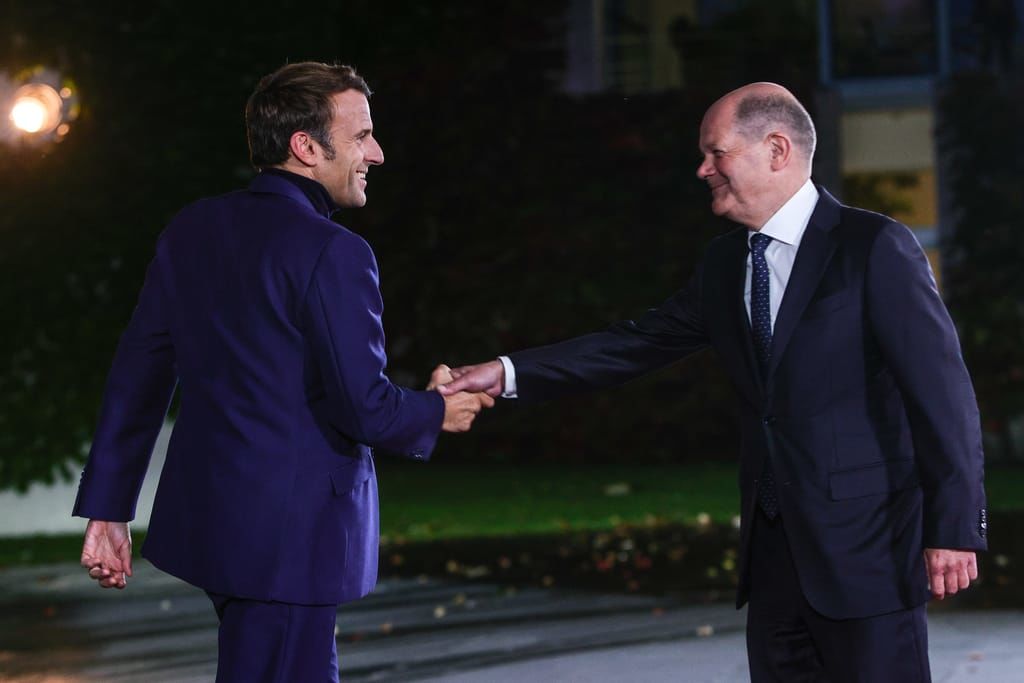
Franco-German tiff threatens to knock EU off balance
When France and Germany can't get along, the entire EU has a problem.
That's what's happening now, as Berlin and Paris had to delay a long-anticipated bilateral summit amid an embarrassing falling-out over key policy areas such as defense and energy. With war raging in Ukraine, the timing could hardly be worse.
Just one day ahead of a crucial European Council summit in Brussels on Thursday and Friday, where EU leaders are expected to clash over how to respond to skyrocketing energy prices, Germany and France announced that their yearly Franco-German ministerial council, which had been planned for next Wednesday in Fontainebleau, south of Paris, would be shifted to January.
Officially, both sides claim that "difficulties on the agenda of some ministers" were the reason for the surprising postponement of their bilateral cabinet meeting, the first instance of that kind of top-tier format since Chancellor Olaf Scholz's government took office last year.
At least five of Scholz's ministers, including Foreign Minister Annalena Baerbock, had complained internally that next Wednesday would have fallen in a rare week where they could take holidays together with their children as they will be on a school break. That, however, seems flimsy reasoning when war is raging on the Continent. The actual reason for the postponement is rooted in significant differences on energy and defense issues, which made it difficult for both sides to agree on a joint declaration that they had planned to sign.
"In some dossiers we are not yet ready to be on the same line. Therefore, knowing that, we said that it would be better to do [the ministerial council] in January, when we are also present with all the important ministers," one German official said, adding that "we are in the process of finding a [new] date."
“There isn’t enough progress on topics [of discussion]," a French official said earlier on Tuesday, when POLITICO first reported the possible postponement.
Scholz and French President Emmanuel Macron might still have a tête-à-tête in Paris next Wednesday, the German official added. Both leaders will also meet in Brussels this Thursday ahead of an EU leaders' summit.
 French President Emmanuel Macron and German Chancellor Olaf Scholz may yet reunite in Paris, a German official said
French President Emmanuel Macron and German Chancellor Olaf Scholz may yet reunite in Paris, a German official said
Officials on both sides said that negotiations between Paris and Berlin had been particularly difficult on energy issues — such as whether to build the Midcat pipeline project running from the Iberian Peninsula to northern Europe. Germany sees this as a vital alternative route to bring North African gas into Europe now that Russia is no longer a reliable supplier.
The two are also at odds over France's demand to introduce price caps on gas and electricity and defense issues, like the joint development of the Future Combat Air System (FCAS) fighter jet.
Germany's go-it-alone approach to pouring up to €200 billion into the German economy to help cushion the impact of soaring energy prices also stoked anger in France, which reckoned Berlin should have consulted its allies over such massive payments that could distort the internal market.
"It isn't unusual that a week before a summit there are still negotiations about the text [of a joint declaration]," said one German official. "But here we had some significant gaps on key issues that need to be discussed at the highest level."
An Elysée official confirmed defense and energy were two areas where progress was needed and that Macron and Scholz would set the date for their next bilateral meeting when they meet in Brussels on Thursday.
“Clearly, we need more discussions on defense, how we align ourselves on European sovereignty. And energy … We need a continent that produces more carbon-neutral energy,” the adviser said.
The Franco-German government joint meetings have been taking place since 2003 at least once a year, but were canceled in 2020 and only held via videoconference in 2021 owing to the coronavirus pandemic. Expectations for this year’s meeting had been particularly high as it would be the first in-person meeting of both governments for three years. Both sides had also expressed strong interest in boosting cooperation, especially in the area of defense where Europe’s lack of autonomy has been laid bare by the war in Ukraine.
French Economy Minister Bruno Le Maire sought to downplay the significance of the postponement on Wednesday: "I just want to [make clear] that the postponement of the […] is linked only to difficulties on the agenda of some ministers, but it has nothing to do with any kind of political difficulties. It is only linked to agenda complexities."
However, two officials in Berlin fumed about the fact that the holiday plans of senior German ministers such as Baerbock and Interior Minister Nancy Faeser were used as a justification to cancel a summit that had been planned for several months.
That justification risks to sound particular weird, or embarrassing, as it involves Germany's diplomatic chief, one official said.
In other EU countries, the postponement also raised eyebrows.
"Maybe the Belgians can come in and mediate between the two," one diplomat in Brussels joked.











